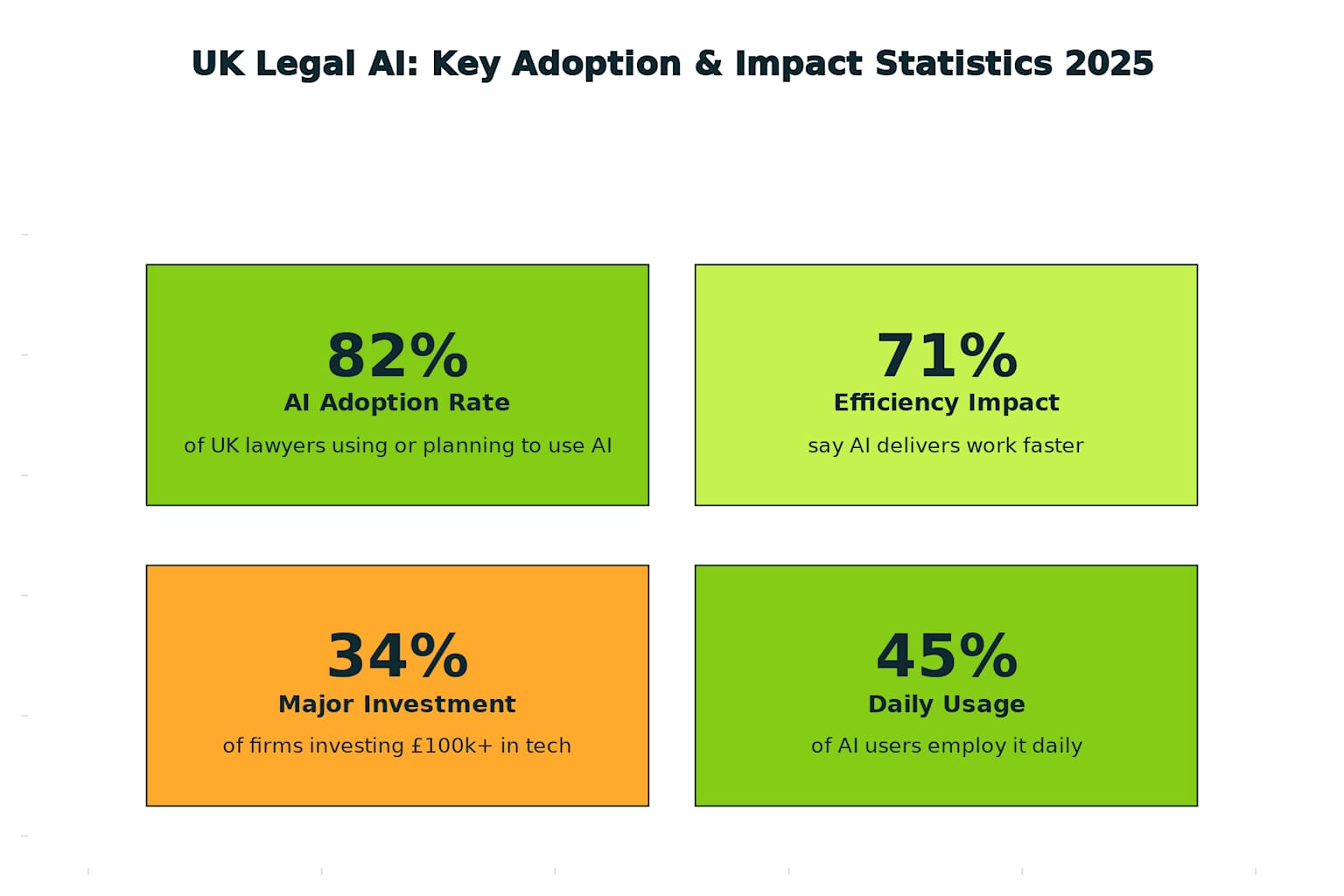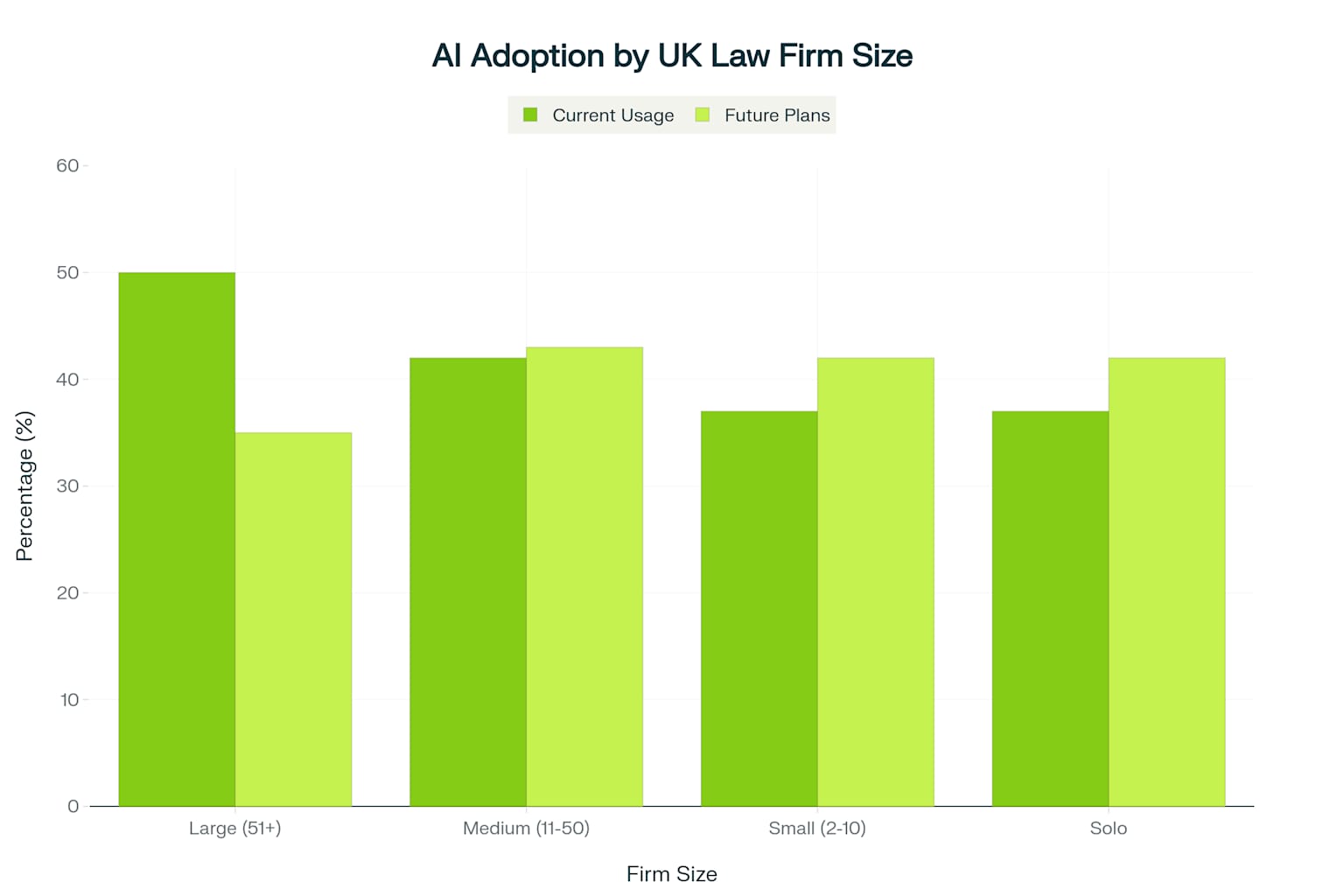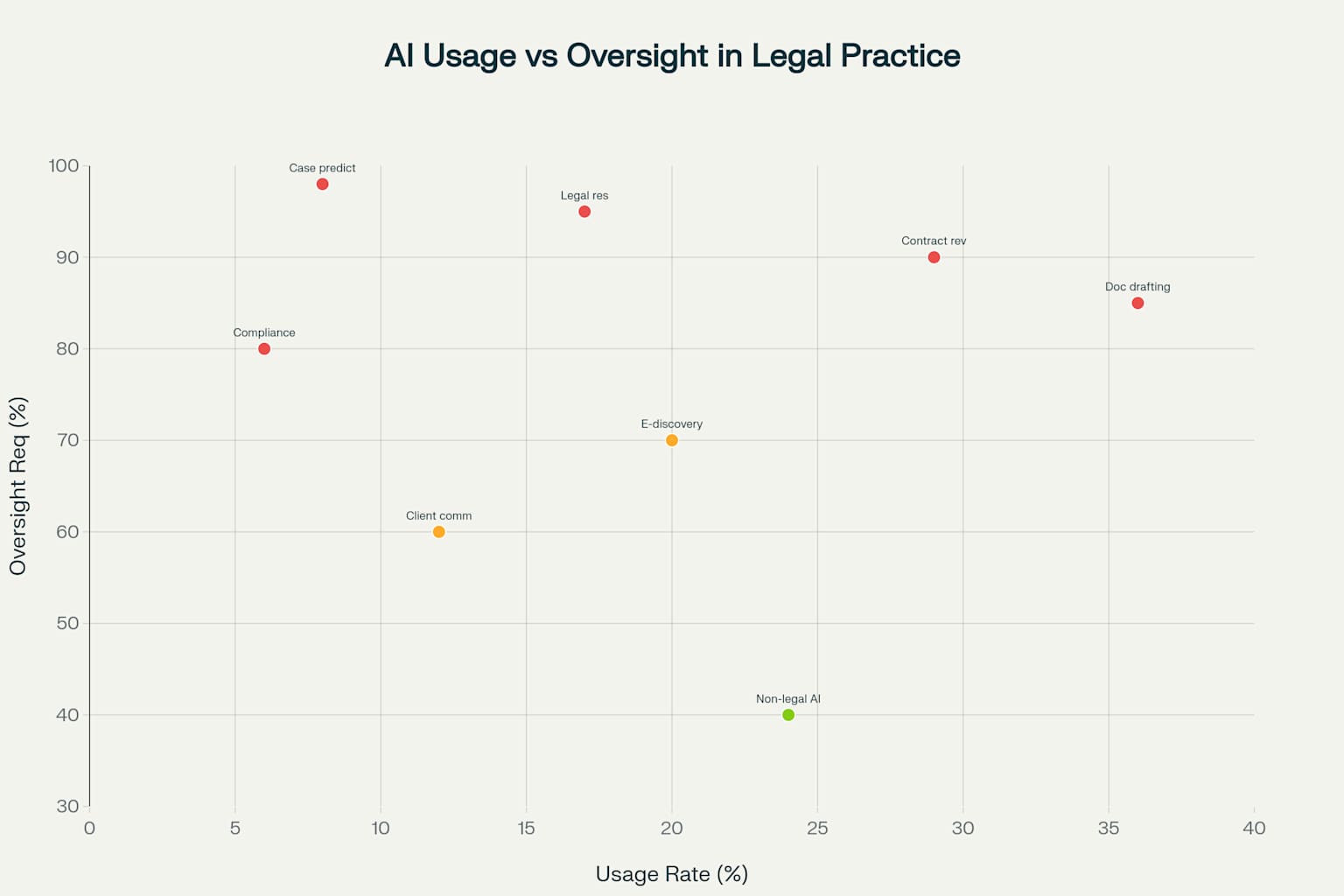Human-in-the-Loop Validation and the Future of Legal Practice

AI as an Enabler, Not a Replacement: Human-in-the-Loop Validation and the Future of UK Legal Practice
A heated debate has been unfolding across LinkedIn and professional forums about whether artificial intelligence - specifically Large Language Models (LLMs), Large Reasoning Models (LRMs), and AI "agents" - will replace many professionals in their roles. At Legavee, we believe focusing on AI replacing professionals misses the point. The rapid advancement of AI since ChatGPT's debut in 2022 has sparked widespread excitement, yet the true transformative potential lies not in replacing UK legal professionals, but in empowering them to deliver better outcomes more efficiently while making legal services more accessible to those who need them most.

The Rapid Evolution of AI Adoption in UK Legal Practice
The UK legal profession's relationship with artificial intelligence has undergone a dramatic transformation in recent years. Recent research reveals that AI adoption among UK legal professionals has more than doubled, with 96% of UK law firms now integrating AI into their operations. Generative AI usage has surged from 11% in July 2023 to 41% by September 2024, demonstrating the sector's rapid embrace of this technology.

This acceleration reflects a growing recognition among UK solicitors and barristers that AI can significantly enhance legal practice when properly implemented. However, this enthusiasm must be balanced with a clear understanding of AI's inherent limitations and the critical role that human expertise continues to play in delivering quality legal services under UK regulatory frameworks.
Understanding the Probabilistic Nature of Language Models in UK Legal Context
At their core, LLMs are probabilistic systems that generate responses based on statistical patterns learned from vast datasets. This fundamental characteristic means they can produce varying outputs even from identical inputs, and their results are not always consistent or accurate. The implications for UK legal practice are particularly profound given the strict professional standards maintained by the Solicitors Regulation Authority (SRA).

Recent academic research has revealed concerning hallucination rates in legal contexts, with LLMs producing incorrect or entirely fabricated information between 58% and 88% of the time when asked direct, verifiable legal questions. In 2023, a litigant-in-person in the UK was found to have used a generative AI tool to unknowingly generate fictitious case citations in a tribunal, highlighting the real risks posed by unchecked AI use in the UK legal system.
These findings underscore why AI systems cannot operate unchecked in UK legal practice, where solicitors remain fully accountable for all work product regardless of how it was generated.
The Essential Role of Human-in-the-Loop Validation in UK Practice
The concept of "human-in-the-loop" (HitL) has become central to responsible AI deployment in UK legal practice. The SRA's ongoing guidance emphasises that solicitors remain fully responsible for work they produce, regardless of whether it came from a human or a machine. This principle-based, technology-neutral approach means that existing regulatory standards must be rigorously applied to AI-enhanced workflows.
Effective HitL implementation in the UK legal context requires several key components. First, experienced legal professionals who understand both English law and AI capabilities must oversee AI outputs. Second, robust validation processes that go beyond cursory review are essential for catching errors and ensuring compliance with SRA standards. Third, clear accountability structures must be maintained where humans remain ultimately responsible for all outputs and decisions. Finally, continuous monitoring systems help identify and correct AI limitations over time whilst maintaining professional indemnity insurance coverage.
The SRA has demonstrated progressive thinking by approving innovative approaches to legal service delivery while maintaining strict requirements for human oversight, professional standards, and accountability. This regulatory approach acknowledges AI's potential while ensuring that consumer protections and professional standards are not compromised.
How AI Augments Rather Than Replaces UK Legal Work
Research consistently demonstrates that AI's greatest value in the UK legal sector lies in handling routine, time-consuming tasks, thereby freeing legal professionals to focus on high-value work requiring human judgment, creativity, and empathy. UK legal professionals increasingly recognise this potential, with 75% of the top 20 UK law firms now actively promoting their use of AI to clients.
Key Applications Where AI Enhances UK Legal Practice
Legal Research and Case Law Analysis represents one of the most promising applications in the UK context. AI can rapidly scan vast databases of English case law, statutes, and legal precedents, providing preliminary analysis that solicitors can then refine, validate, and apply to specific client situations. However, human expertise remains crucial for understanding the nuances of English common law and ensuring strategic application.
Document Review and E-Discovery has seen significant adoption in UK courts, where predictive coding is now expressly permitted under the Civil Procedure Rules. Leading UK firms like Norton Rose Fulbright have successfully utilised AI-assisted e-discovery tools during major government inquiries, demonstrating how technology can enhance efficiency whilst maintaining quality standards.
Contract Analysis and Commercial Work showcases AI's ability to identify non-standard terms, compliance issues, and potential risks across large contract portfolios. Firms like VWV have invested approximately £250,000 in AI technology, working with legal tech start-ups like Robin AI to improve efficiency in contract reviews and drafting.
Client Communication and Access Services through AI-powered systems can handle routine inquiries and provide support. Citizens Advice has successfully trialled Caddy, an AI-powered assistant that draws information from GOV.UK and their proprietary knowledge base, reducing response times from nine minutes to four minutes whilst maintaining supervisor approval.
The UK Access to Justice Imperative
Perhaps the most compelling argument for AI as an enabler rather than a replacement lies in its potential to address the UK's persistent access to justice crisis. Recent research reveals that millions of people across England and Wales cannot access legal aid when they need it most. In England and Wales, legal aid now meets only 43% of the demand for asylum-related advice, a steep drop from 83% coverage in 2022.
The crisis extends across all areas of civil legal aid. Across England and Wales, 53 million people (90%) do not have access to a local education legal aid provider, whilst 50.6 million people (84.9%) lack access to welfare legal aid providers. The situation is particularly acute outside major cities, with the southwest, north, northeast and east bereft in almost all areas of law.
By automating routine tasks and reducing operational costs, AI enables UK law firms and legal aid providers to serve more clients with existing resources, provide faster response times and improved service delivery, extend services to underserved populations who previously couldn't access legal help, and offer more competitive pricing without compromising on quality.
The Collaborative Future: Humans and Machines Working Together
The future of UK legal practice is not about humans versus machines - it's about humans and machines working together to achieve better outcomes whilst maintaining the high professional standards expected under English law. This shift in perspective from replacement to enablement unlocks new possibilities for innovation and improved service delivery across the UK legal profession.
As UK legal professionals increasingly adopt AI tools, we're witnessing a transformation in roles rather than elimination of positions. Solicitors and barristers are evolving to become orchestrators of AI-enhanced workflows, focusing more on strategic advisory work and high-level decision-making, complex problem-solving that requires human judgment and understanding of English law, client relationship management and empathetic counselling, and creative legal arguments and innovative solutions.
UK Regulatory Framework and Ethical Considerations
The UK's approach to AI regulation takes a principles-based, innovation-friendly stance that empowers existing sectoral regulators like the SRA to interpret core AI principles appropriately for the legal sector. Unlike the EU's prescriptive AI Act, the UK framework encourages responsible innovation whilst maintaining high ethical standards.
The SRA's key principles remain paramount: acting in ways that uphold public trust and confidence in the profession, maintaining integrity in all dealings, and acting in the best interests of each client. These foundational duties apply regardless of whether work is performed by junior staff, external contractors, or AI systems.
UK legal professionals must also navigate data protection requirements under UK GDPR and guidance from the Information Commissioner's Office, ensuring that AI systems processing personal data meet requirements for lawful, fair and transparent processing.
Legavee's Vision: Matter as an Enablement Platform for UK Legal Practice
At Legavee, our first product, Matter, embodies this philosophy of AI as an enabler specifically designed for the UK legal market. Rather than attempting to replace legal professionals, Matter is designed to sit at the centre of legal work, assisting everyone involved in a matter - solicitors, barristers, clients, and other stakeholders - to achieve better outcomes more efficiently whilst maintaining compliance with UK regulatory requirements.
Matter's human-in-the-loop approach ensures compliance with SRA standards whilst AI handles routine tasks like document summarisation and deadline tracking, humans retain control over all strategic decisions and client interactions, quality assurance remains paramount through experienced legal oversight, and collaboration is enhanced rather than replaced by technology.
Our roadmap reflects the UK market's specific needs, with closed alpha testing with select UK partners beginning in Q3 2025, invite-only beta for UK legal and tech partners in Q4 2025, open beta for UK law firms in Q1 2026, and full UK launch with comprehensive SRA compliance in Q2 2026.
Looking Forward: Best Practices for UK Legal AI Implementation
For UK legal professionals considering AI adoption, several best practices emerge from successful implementations across the sector. Firms should start with routine tasks where AI can provide immediate value with lower regulatory risk, invest in comprehensive training to ensure team members understand AI capabilities and limitations under UK law, implement robust validation processes with experienced oversight that meets SRA standards, maintain transparency with clients about AI usage and obtain appropriate consent, stay informed about evolving UK regulations and SRA guidance, and choose providers who prioritise human-in-the-loop design and understand UK regulatory requirements.
The UK's tailored approach to AI regulation provides a framework that supports innovation whilst maintaining the high professional standards that define excellent legal practice. Success will come to those firms that embrace AI as a collaborative tool whilst never losing sight of their fundamental duties to clients and the justice system.
Conclusion: Embracing AI as a Collaborative Tool in UK Legal Practice
The debate about AI replacing UK legal professionals reflects a fundamental misunderstanding of both AI's current capabilities and the nature of excellent legal work under English law. While AI systems are powerful tools for processing information and automating routine tasks, they lack the judgment, empathy, creativity, and contextual understanding of UK legal frameworks that define outstanding legal practice.
The most successful UK law firms of the future will be those that embrace AI as a collaborative tool whilst maintaining rigorous compliance with SRA standards and UK regulatory requirements. By implementing robust human-in-the-loop validation, maintaining high professional standards, and focusing relentlessly on client outcomes, UK legal professionals can harness AI's power to deliver better, faster, and more affordable legal services.
At Legavee, we're committed to building AI tools that empower UK legal professionals rather than replace them. Our vision is one where technology handles routine work, allowing humans to focus on what they do best: providing strategic counsel, advocating for clients under English law, and ensuring access to justice for all who need it across the United Kingdom.
The future isn't about choosing between humans and machines - it's about creating partnerships that amplify human expertise whilst maintaining the highest standards of professional practice that define the UK legal profession. This is where AI becomes truly transformative: not by replacing professionals, but by empowering them to serve their clients and society more effectively than ever before.
References
[1] https://www.lexisnexis.co.uk/blog/future-of-law/weighing-the-pros-cons-of-ai-for-lawyers
[2] https://www.osborneclarke.com/insights/Regulatory-Outlook-March-2025-Artificial-intelligence
[3] https://www.lexisnexis.co.uk/blog/future-of-law/ai-adoption-soars-across-uk-legal-sector
[7] https://www.sra.org.uk/solicitors/resources/innovate/compliance-tips-for-solicitors/
[8] https://www.cenza.co/human-in-the-loop-the-inevitable-in-the-life-of-legal-ai/
[9] https://www.lawsociety.org.uk/Topics/AI-and-lawtech/Whats-changing/AI-lawtech-policy
[10] https://www.lawsociety.org.uk/topics/ai-and-lawtech/generative-ai-the-essentials
[11] https://lawsociety.libguides.com/AI/professional-guidance
[13] https://www.lexisnexis.co.uk/blog/future-of-law/ai-adoption-soars-across-uk-legal-sector
[14] https://www.galleo.ai/insights/uk-sra-ai-legal-practice-guidelines
[15] https://www.linkedin.com/pulse/why-uk-law-firms-must-embrace-ai-genai-automation-now-gilmurray-ohw2e
[16] https://www.lawgazette.co.uk/news/regulators-urged-to-fix-access-to-justice-crisis/5122869.article
[18] https://channeleye.media/75-of-top-uk-law-firms-promote-their-use-of-ai-to-clients/
[20] https://kpmg.com/xx/en/our-insights/regulatory-insights/evolving-plans-for-ai-regulation.html
